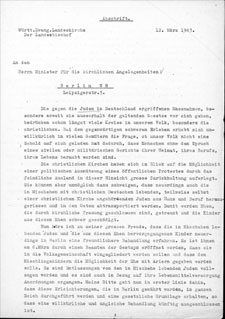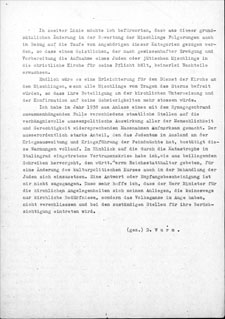Protest against the Persecution of the Jews
Church governments did not react to the deportations Jewish fellow citizens to the East that commenced in 1941; the Württemberg regional bishop did not make any statements in his various petitions to ministries and Hitler until 1943 when rumors about the deportees’ true situation grew and Christians of Jewish descent were additionally also being affected by expulsions and inhumane treatment.
At first, he complained to the Minister of Church Affairs about the treatment of the Jews in general. He pointed out that many people were asking themselves whether the German nation was not incurring guilt on itself since it was robbing people of their home, their profession, their life without the decision of a civil or military court. Then, he drew attention to the particular fate of Christians of Jewish descent, whose marriages were being forcibly dissolved.
Until then, he had kept silent out of concern for the misuse of a protest by hostile foreign countries but now had to raise an objection. The loss of confidence after the defeat of Stalingrad also made a change in the course of cultural policy, even in the treatment of Jews, necessary. Wurm relied on appeals and on arguments; he hoped that the difficult domestic and foreign situation would move the leadership to make concessions.
Source / title
- © Landeskirchliches Archiv Stuttgart, D1/108


